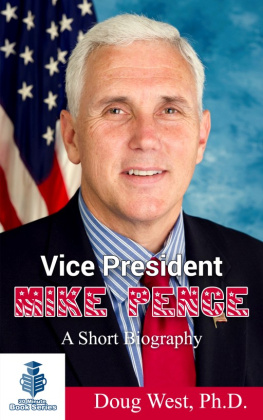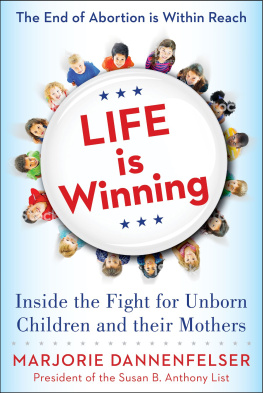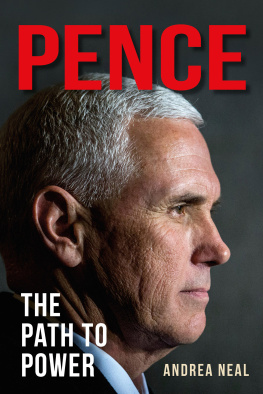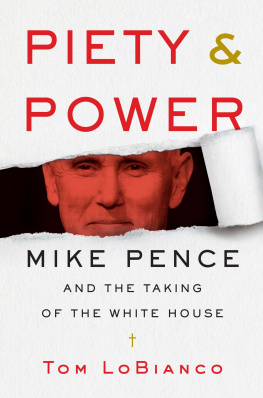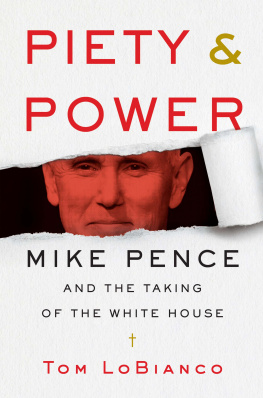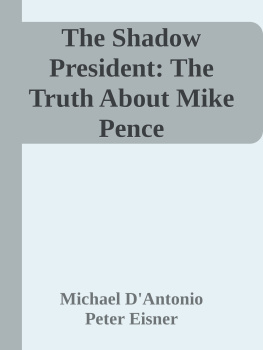Contents
Guide
Pagebreaks of the print version

The author and publisher have provided this ebook to you for your personal use only. You may not make this ebook publicly available in any way. Copyright infringement is against the law. If you believe the copy of this ebook you are reading infringes on the authors copyright, please notify the publisher at:
us.macmillanusa.com/piracy.
For Toni and Musha
With the Trump administration pursuing the sources of news leaks as if they were espionage agents, officials in Washington were quite cautious about speaking to us on the record about events and personalities inside the White House. For that reason, we must offer our gratitude to several sources, including Pence confidants and members of Congress, without mentioning names. Those who shared their insights did so in the interest of establishing an accurate record in a time when even the existence of facts has been cast into doubt. Their efforts stand in contrast to the vice presidents aides, who declined repeated requests for even the most basic information.
Among the reliable, on-the-record helpers in Washington we thank retired senator Richard Lugar, former members of Congress Phil Sharp and Baron Hill, Stephen Moore of the Heritage Foundation and former Indianapolis Star Washington correspondent George Stutteville.
Our reporting efforts were aided, quite heroically, by Indiana-based journalist Adam Wren and Brooklyns Victoria DeSilverio, whose way with data is a wonder to behold. Brian Howey, the dean of Hoosier political reporters, was most generous with recollections, advice, and sources. Steven Porter, journalist, shared many sources and perspectives. Cheryl Owsley Jackson opened doors in Columbus, which led us to, among others, Rev. Mike Harris, a high school classmate of the vice president, as well as former Columbus mayors Fred Armstrong and Kristen Brown. Jan Carroll, Jeff Smolyen, and Ambassador Dan Kurtzer were generous with their time and insights.
Other Columbus-area insiders who aided our effort included Tracy Souza, Cummins executive and daughter of Lee Hamilton, who served Indiana as a member of Congress for thirty-four years, and Bob Hyatt of the Bartholomew County Democratic Party. Bud Herron, former publisher of the Columbus Republic, shared much of what he knows about his community and its characters. We recommend his writing, especially Cat Bathing as a Martial Art, which can be read at http://blakjak.org/cat_bath.htm.
We received much valuable insight and advice from Chris Warren of Indy Pride, Mayor James Brainerd of Carmel, Indiana, and from Bill Oesterle, who is one of the states leading businesspeople. Sherman Johnson, Jim Shella, Ann DeLaney, Ed Delaney, John Krull, and Mary Beth Schneider provided invaluable recollections and insights. Joshua Blachorsky, Orly Azoulay, and Tal Schneider demystified scriptural and political issues arising out of the vice presidents activities in the Middle East. Thanks also to Calev Ben-David, anchor at TV i24 in Jerusalem, for his time in discussing Mike and Karen Pences Israel trip. Just as thorny were the legal issues made understandable by attorneys Jay Jaffe and William Groth. Cole Varga of Exodus Refugee aided our understanding of Governor Pences opposition to refugee resettlement in Indiana.
As with every book, this one is built upon the foundation of writing done by many others, especially newspaper journalists in Indiana, Washington, and New York, and authors including Jane Mayer, Jeff Sharlet, Julie Ingersoll, Katherine Stewart, Marie Griffith, Nancy MacLean, Frances FitzGerald, and many others.
Our editors of first resort, Musha Salinas Eisner and Toni Raiten-DAntonio, contributed brilliantly to the cause of this book. At St. Martins Press we were ably served, and sometimes saved, by publisher Thomas Dunne, editor Stephen S. Power, and assistant editors Janine Barlow and Samantha Zuckergood. A production team headed by John Morrone and Amelie Littell made a tight schedule comfortable, and Michael K. Cantwell proved, once again, to be the best friend authors could want. Likewise, the publicity and marketing efforts of Tracey Guest, Kathryn Hough, and Laura Clark have assured that the most important people in the publishing worldreaderslearn of our efforts.
Finally, we acknowledge our late friend and editor at Newsday , Les Payne, whose enthusiasm and encouragement energized our efforts. Les brought us together as a team thirty years ago, and inspired us ever since. In this book, we take to heart his rallying cry for all journalists: tell the truth and duck.
Behold, I tell you a mystery.
1 Corinthians 15:51
As noon approached on January 20, 2017, Associate Supreme Court Justice Clarence Thomas summoned Michael Richard Pence before him at the lectern on the West Front of the United States Capitol. Surrounding the two men were politicians, public officials, family, and assorted dignitaries arrayed to form a tableau of democratic tradition. Allies and adversaries, their conflicts and contests set aside for the moment, bore witness to the transition of power.
Pence had chosen one of the most conservative Supreme Court justices in U.S. history to administer his oath of office as vice president of the United States. The symbolism was complete when Thomas directed Pence to place his left hand on Ronald Reagans Bible, which was held by Pences wife, Karen. Reagan had been Pences midwestern hero and role model, even before he had met him briefly twenty-eight years earlier.
Mr. Vice President elect, would you raise your right hand, said Thomas, though Pence had already done so. The justice grimaced slightly. Known for rarely speaking from the bench or in public at all, Thomas appeared ill at ease. After a pause, he summoned a resonant baritone voice and said, Repeat after me. The vice president elect did as instructed, swearing that he would support and defend the Constitution of the United States against all enemies, foreign and domestic. So help me God.
After he finished the oath, the vice president embraced his family, shook hands with some of the assembled luminaries, and then retreated from the center of attention. As he stood beside his wife, Pence struck his humility posebrow furrowed, mouth downturned, eyes focused on some distant pointas he had on countless public occasions.
For decades, Pence had presented himself as a humble servant who could be entrusted with power because he was, at heart, a mild-mannered midwesterner. Friends and foes alike said his major character trait was extreme niceness. When given the opportunity, Pence described himself as a true Hoosier son of Indiana who was a Christian, a conservative, and a Republican in that order. This is how he had introduced himself to the country at the Republican National Convention six months earlier. The list contrasted with the usual pledge politicians make to put country first. This is what President Obama did after the 2016 election when he said, We are not Democrats first. We are not Republicans first. We are Americans first.
The vice presidents self-declared identity revealed both his priorities and the source of his power. For thirty years he had helped lead the Republican Party into a closer alliance with preachers who were turning evangelical Christianity from a religion into a political crusade that engaged in a culture war against nonbelievers. The aim of many was to destroy abortion rights, roll back the equality gained by gay citizens, and prepare the nation for the Second Coming of Christ.


